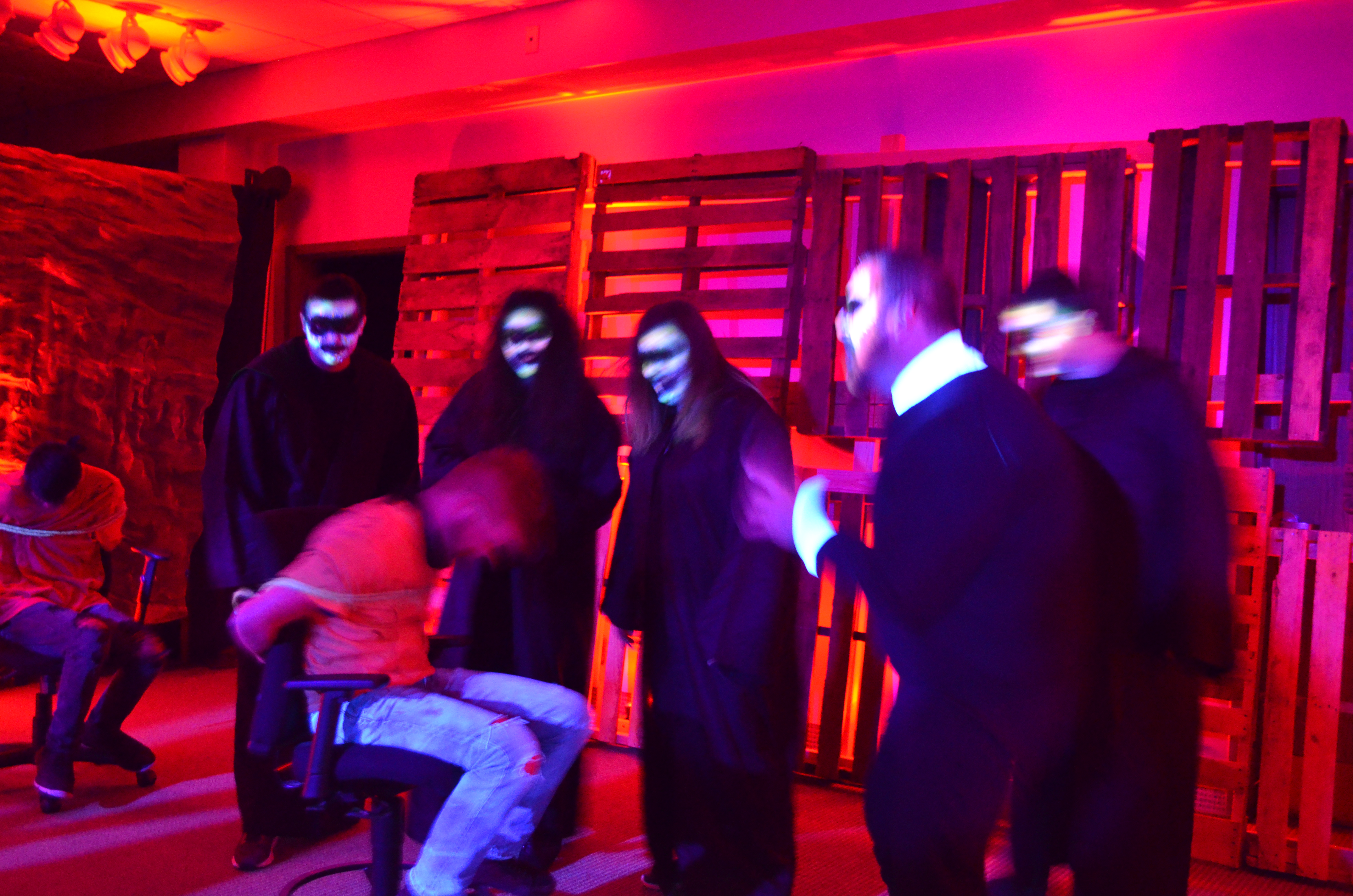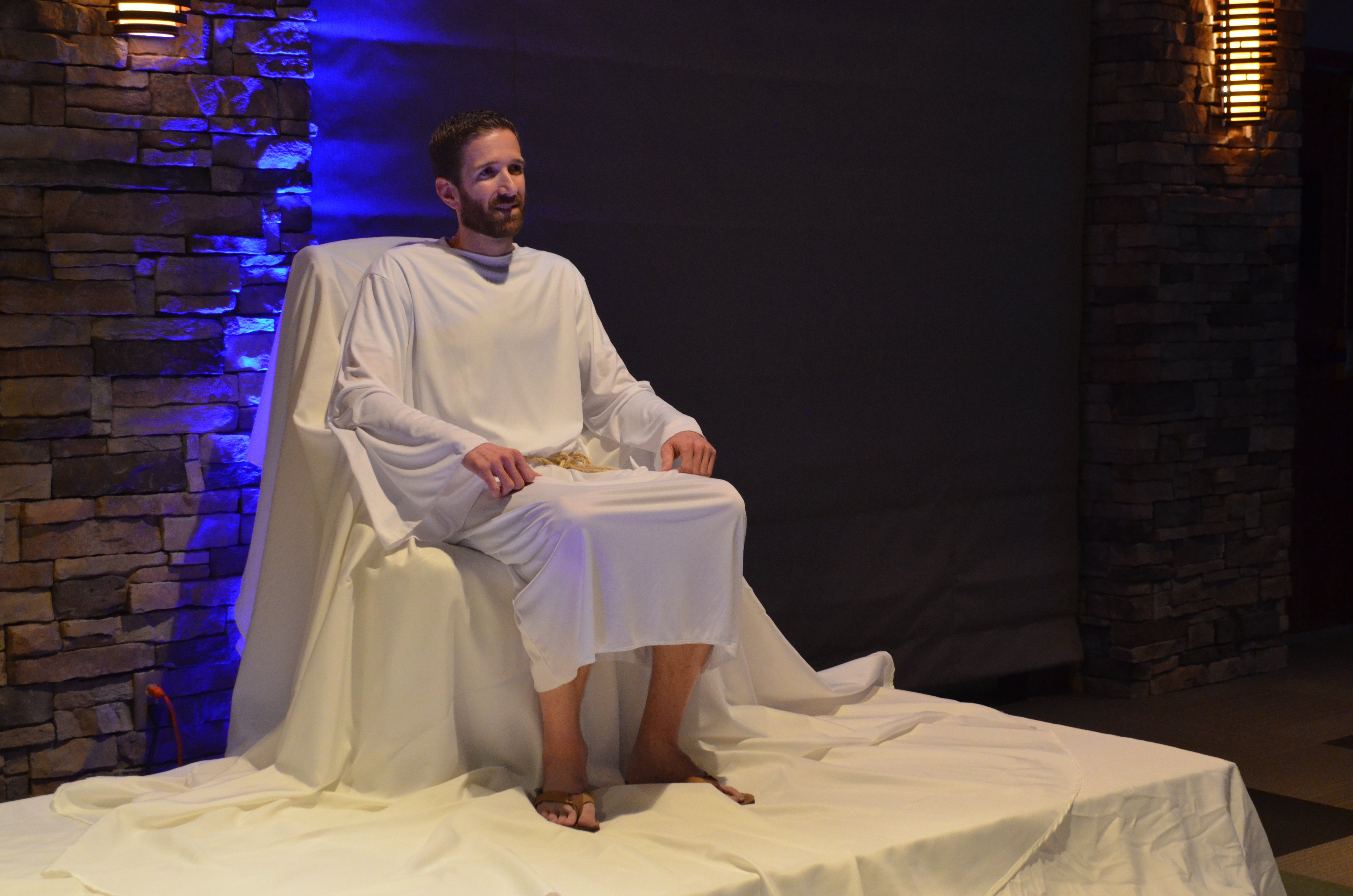It’s around 8:30 p.m. when we find ourselves standing at the gates of heaven. And the gates of hell. Which we enter is entirely our choice.
In front of us stands a woman behind a podium, dressed in a black robe and reading from a thick binder. In a booming voice she explains the choice at hand: accept Jesus in life as the one true God and be saved; reject him and be damned.
One actor after another comes forward to receive their judgement. A kidnapper who attempted to sell a pair of girls into sex trafficking is sent to hell without pause or pleading. A teenager who laid down his life for his friends but refused to acknowledge Jesus is damned to an eternity with Satan. A girl who accepts Christ in the final moments of her life is awarded with entrance to heaven.
And now it’s our turn. To the right, the black, rusty gates of hell. A hungry, wide-smiling demon. Her talon-like hand beckons to us — a sinister welcome — as we stand before the judge in the dimly lit room. We peek to our left: the billowing white entrance of heaven. We force ourselves to look straight ahead at the judge. Her head is buried in what she calls the Lamb’s Book of Life, containing the fate of each earthly soul, preparing to give us our sentence. Did we live by way of the Gospel, which will play out in our salvation, or have we refused to accept Christ, and will thus be subject to damnation? There’s no inbetween as you stand before judgement.
This whole production is part of an experience called a judgement house. Formed in the 1980s and steeped in non-denominational Christian culture, judgement houses are immersive dramas aimed at forcing participants to confront the abstract ideas of heaven, hell, and what happens after death. Traditionally presented by Christian churches in the final weeks of October, judgement house bristles against its connotation with Halloween. Judgement houses like the one we visited at Christ Church in Fairview Heights, Illinois, aren’t supposed to be scary. They’re attempting to spread the message of God’s love. But in their quest to portray the Bible — specifically, its depiction of the afterlife — the reality is that that depiction is rooted in fear.

“Life is Short but Eternity is Long.”
“We just want to present what we believe the Bible teaches, which, by the way, is a scary book,” says Tom Hudgins, founder and president of the Wichita, Kansas-based Judgement House organization, the operation behind all the judgement houses scattered around the country. “What the Bible teaches is that life is short, but eternity is long, and that you can end up in one of two places.”
According to Hudgins, Judgement House’s goal is to spread the love and teachings of Jesus by way of the Gospel, rather than scare people into pledging their lives to him. The demon that beckoned us in the judgement scene proved differently. A judgement house can feature one of many storylines, but all have an essential message: life can end at any time, and only those who verbally acknowledge Jesus as the one true savior will be judged favorably in the eyes of God.
Hudgins saw a need for Judgement House in 1983 as a student pastor in Alabama. Young people in his congregation were running into trouble with the law at Halloween: teenage shenanigans like blowing up mailboxes with M80s and throwing eggs on cars from interstate overpasses. So he devised a way to keep them occupied with the church, and Judgement House was born.
Thirty-five years later, it’s a full-blown international organization. Judgement House provides scripts and training materials to interested churches for a fee. There are usually 15 or 20 scripts for churches to choose from in any given year, with storylines ranging from a deadly car crash to school shootings to drug overdoses. When a church signs on to present a judgement house, they alone are involved in creating sets, casting actors, setting dates and attendance fees, and promoting their event. The baseline cost for presenting an official judgement house is $479, but can quickly rise with the additional cost of add-on services like promotional materials. The average cost of a first-year judgement house comes in at around $3,500, with some churches spending as much as $15,000. While judgement houses typically take place on the weekends surrounding Halloween, Hudgins says it’s not a requirement. Some churches have presented judgement houses in March, July, and August.
Despite Hudgins’ insistence that judgement houses are not intended to be scary, he acknowledges the experience is rooted at least somewhat in terror. “It’s not Sunday school, I’ll just tell you,” Hudgins says. “They go through the hell scene, and there’s gnashing of teeth, loud noises, darkness. It’s discomfort, not a fun room to be in. You’re ready to get out of it. That’s just what we believe is reality in the Bible according to scripture. So if that makes you afraid, okay.”
Hudgins estimates 5 million people have attended a judgement house since that first one in 1983, and 500,000 of those attendees have accepted Christ into their lives. “I’ve met many people,” Hudgins says, “who would tell you their lives were changed having walked through that presentation and recognized their need for Jesus.”

“Something was Missing.”
One of those people is Doug Conner. Twelve years ago, he attended his first Judgement House in Columbia, Illinois. He wasn’t religious at the time, but joined a Bible study group at the suggestion of his son’s baseball coach. That led him to a judgement house.
What really got to Conner was that the actor playing Jesus spoke to him by name — despite having never met him before. “I didn’t even know the guy, so it was pretty impactful,” Conner says. “He ended up being in my Bible study later on, and when I talked to him about it, he didn’t even remember calling me by my name.” Conner became a believer that night.
The experience was so powerful for Conner that he made the decision to get involved in a judgement house himself. He volunteered for five years before joining Christ Church, and bringing the program there. Christ Church has just wrapped its third year of Judgement House productions, and Conner is still involved as an actor and lead set builder.

“It’s a Fear Tactic as Opposed to Any Notion of Christian Love.”
Christianity has a loaded history when it comes to the ideas of heaven and hell, love and fear, acceptance and damnation. “I think that’s one of the big divisions in the Christian churches,” says Rev. Gary James, minister at First Unitarian Church of St. Louis. “Judgement always presupposes an authoritarian approach to religion and the determination of who is lovable and who’s not lovable. I think that’s the distinction between much of liberal Christianity versus conservative Christianity.”
Unitarianism belongs to a more liberal sect of Christianity, whereas most Evangelical and non-denominational churches, the bread and butter of the judgement house world, tend to fall more conservative. Unlike many Christian traditions, Unitarianism doesn’t place importance on heaven and hell.
“I mean, I just find the speculation of heaven (and) hell to take on a kind of fantastical, fictional, Stephen King kind of expression,” James says. “The very notion of taking it literally baffles me in terms of the capacity of people to do so. But if you’ve been indoctrinated in those teachings of the church as a child, I guess I could imagine why you would choose to do so.”
James takes issue with the representation of hell itself that Judgement Houses present. “In large part, our mindset (is that hell is) a different order of reality based on pure speculation, rather horrific speculation at that, and it’s in large part, I think, abused by the church,” James says. “It’s a fear tactic as opposed to any notion of Christian love … It’s based on such a dramatic presentation of a certain very small portion of the Bible as well, and there’s very limited reference in the Bible to hell.”
Judgement House would have you believe the world is separated between believers and nonbelievers, damned and saved. “If you haven’t accepted Christ as your Lord and savior, you’re damned. That’s the presupposition, which means the overwhelming population of the world at large,” James says. “So it really is a rather horrific division that you’re imposing upon the world and the entire world population. That sounds demonic to me, ironically enough.”
As for people who have found love and salvation within the Judgement House experience, James says those who are looking for something bigger will probably find it, regardless of the means. “You’re simply scared into your own personal salvation,” James says. “If you’re looking for that kind of community, then you’re going to find it in a whole variety of expressions.”
“When You Die, What Are You Going to Do?”
Back in front of the judge, we’re faced with a pivotal scene. One by one we’re called by name to receive our fates. But we’re lucky today, the judge says. It’s not time for our final judgement yet — but we never know when that day may come.
We’re guided into a short trip through hell, where we witness Satan and his demons tormenting the characters sentenced there from behind its gates. Among the darkness and lava-like red lights, Satan’s jeering henchmen flash their neon-tinged eyes at us and writhe like serpents. Before we’re allowed to move on, the devil himself stalks among us, fixating his black rimmed eyes seemingly deep into our souls.
After we file out through the gates of hell, we stumble through a dark corridor until we see bright white light in the distance. As it gets closer, two gentle-looking women emerge and drape our shoulders with silky white stoles. A set of doors are thrown open to reveal a serene Jesus sitting upon his heavenly throne. The tall, bearded, sandaled white man takes his time walking through the group, holding a soft smile. Uplifting Christian rock music plays from a stereo system above.
He paces slowly before us, reciting the Gospel, and reminding us to read it, preach it, accept it, and stand by it throughout our lifetime. He pauses frequently; allowing us to absorb his words and their meaning.
Uniquely weaved into his lines is this message: if we want to end up here for real, we need to make the right choices in life. It’s less about being a consistently good person than it is about loudly and proudly accepting Jesus as savior.
After leaving Heaven, we remove our stoles, and we’re ushered into two rows of folding chairs and guided in prayer with bowed head. We’re asked to repeat after the prayer leader in pledging our lives to Jesus. Following the prayer, the leader asks for visual confirmation of people who are acknowledging Jesus for the first time or those who are reaffirming their faith. Those who raised their hands are pulled aside for further discussion and prayer. Over the course of the two days that Christ Church presented its Judgement House, 100 people recommited their lives to Jesus and 28 accepted him into their lives for the first time.
“We just wanted to show people that, hey, you never know when your day’s coming and when you’re going to die,” Hudgins says. “And when you die, what are you going to do?”

